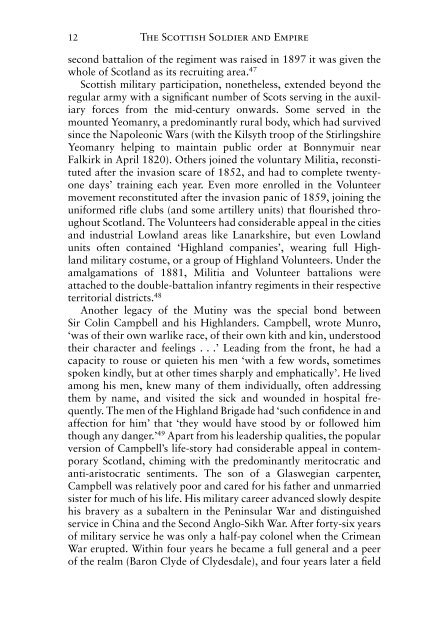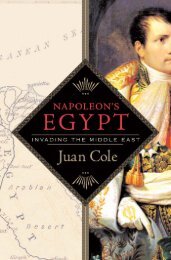The Scottish soldier and Empire, 1854-1902 - Reenactor.ru
The Scottish soldier and Empire, 1854-1902 - Reenactor.ru
The Scottish soldier and Empire, 1854-1902 - Reenactor.ru
You also want an ePaper? Increase the reach of your titles
YUMPU automatically turns print PDFs into web optimized ePapers that Google loves.
12 <strong>The</strong> <strong>Scottish</strong> Soldier <strong>and</strong> <strong>Empire</strong><br />
second battalion of the regiment was raised in 1897 it was given the<br />
whole of Scotl<strong>and</strong> as its rec<strong>ru</strong>iting area. 47<br />
<strong>Scottish</strong> military participation, nonetheless, extended beyond the<br />
regular army with a significant number of Scots serving in the auxiliary<br />
forces from the mid-century onwards. Some served in the<br />
mounted Yeomanry, a predominantly <strong>ru</strong>ral body, which had survived<br />
since the Napoleonic Wars (with the Kilsyth troop of the Stirlingshire<br />
Yeomanry helping to maintain public order at Bonnymuir near<br />
Falkirk in April 1820). Others joined the voluntary Militia, reconstituted<br />
after the invasion scare of 1852, <strong>and</strong> had to complete twentyone<br />
days’ training each year. Even more enrolled in the Volunteer<br />
movement reconstituted after the invasion panic of 1859, joining the<br />
uniformed rifle clubs (<strong>and</strong> some artillery units) that flourished throughout<br />
Scotl<strong>and</strong>. <strong>The</strong> Volunteers had considerable appeal in the cities<br />
<strong>and</strong> industrial Lowl<strong>and</strong> areas like Lanarkshire, but even Lowl<strong>and</strong><br />
units often contained ‘Highl<strong>and</strong> companies’, wearing full Highl<strong>and</strong><br />
military costume, or a group of Highl<strong>and</strong> Volunteers. Under the<br />
amalgamations of 1881, Militia <strong>and</strong> Volunteer battalions were<br />
attached to the double-battalion infantry regiments in their respective<br />
territorial districts. 48<br />
Another legacy of the Mutiny was the special bond between<br />
Sir Colin Campbell <strong>and</strong> his Highl<strong>and</strong>ers. Campbell, wrote Munro,<br />
‘was of their own warlike race, of their own kith <strong>and</strong> kin, understood<br />
their character <strong>and</strong> feelings . . .’ Leading from the front, he had a<br />
capacity to rouse or quieten his men ‘with a few words, sometimes<br />
spoken kindly, but at other times sharply <strong>and</strong> emphatically’. He lived<br />
among his men, knew many of them individually, often addressing<br />
them by name, <strong>and</strong> visited the sick <strong>and</strong> wounded in hospital frequently.<br />
<strong>The</strong> men of the Highl<strong>and</strong> Brigade had ‘such confidence in <strong>and</strong><br />
affection for him’ that ‘they would have stood by or followed him<br />
though any danger.’ 49 Apart from his leadership qualities, the popular<br />
version of Campbell’s life-story had considerable appeal in contemporary<br />
Scotl<strong>and</strong>, chiming with the predominantly meritocratic <strong>and</strong><br />
anti-aristocratic sentiments. <strong>The</strong> son of a Glaswegian carpenter,<br />
Campbell was relatively poor <strong>and</strong> cared for his father <strong>and</strong> unmarried<br />
sister for much of his life. His military career advanced slowly despite<br />
his bravery as a subaltern in the Peninsular War <strong>and</strong> distinguished<br />
service in China <strong>and</strong> the Second Anglo-Sikh War. After forty-six years<br />
of military service he was only a half-pay colonel when the Crimean<br />
War e<strong>ru</strong>pted. Within four years he became a full general <strong>and</strong> a peer<br />
of the realm (Baron Clyde of Clydesdale), <strong>and</strong> four years later a field

















